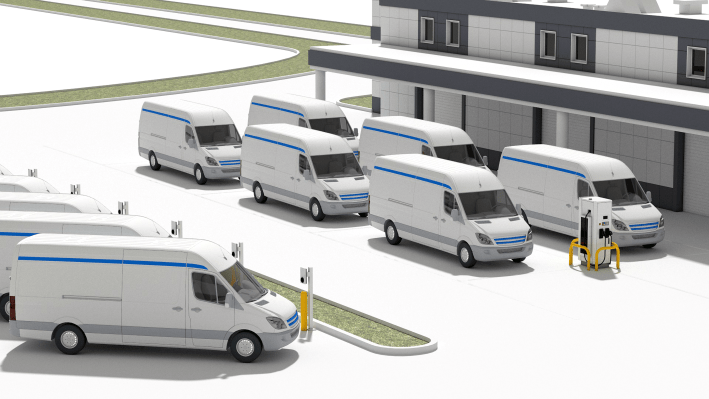

Swiss automation and technology company ABB has announced a collaboration with Amazon Web Services (AWS) to create a cloud-based EV fleet management platform that it hopes will hasten the electrification of fleets. The platform, which the company says will help operators maintain business continuity as they switch to electric, will roll out in the second half of 2021.
This announcement comes after a wave of major delivery companies pledged to electrify their fleets. Amazon already has a number of Rivian-sourced electric delivery vans on the streets of California and plans to have 10,000 more operational by this year; UPS ordered 10,000 electric vans from Arrival for its fleet; 20% of DHL’s fleet is already electric; and FedEx plans to electrify its entire fleet by 2040. A 2020 McKinsey report predicted commercial and passenger fleets in the U.S. could include as many as eight million EVs by 2030, compared with fewer than 5,000 in 2018. That’s about 10-15% of all fleet vehicles.
“We want to make EV adoption easier and more scalable for fleets,” Frank Muehlon, president of ABB’s e-mobility division, told TechCrunch. “To power progress, the industry must bring together the best minds and adopt an entrepreneurial approach to product development.”
ABB brings to the table experience in e-mobility solutions, energy management and charging technology, which will combine with AWS’s cloud and software to make a single-view platform that can be tailored to whichever company is using it. Companies will be able to monitor things like charge planning, EV maintenance status and route optimization based on the time of day, weather and use patterns. Muehlon said they’ll work with customers to explore ways to use existing data from fleets for faster implementation.
The platform will be hosted on the AWS cloud, which means that it can scale anywhere AWS is available, which so far includes in 25 regions globally.
The platform will be hardware-agnostic, meaning any type of EV or charger can work with it. Integration of software into specific EV fleets will depend on the fleet’s level of access to third-party asset management systems and onboard EV telematics, but the platform will support a layered feature approach, wherein each layer provides more accurate vehicle data. Muehlon says this makes for a more seamless interface than existing third-party charging management software, which don’t have the technology or the flexibility to work with the total breadth of EV models and charging infrastructure.
“Not only do fleet managers have to contend with the speed of development in charging technology, but they also need real-time vehicle and charging status information, access to charging infrastructures and information for hands-on maintenance,” said Muehlon. “This new real-time EV fleet management solution will set new standards in the world of electric mobility for global fleet operators and help them realize improved operations.”
This software is aimed at depot and commercial fleets, as well as public infrastructure fleets. Muehlon declined to specify any specific EV operators or customers lined up to use this new technology, but he did say there are “several pilots underway” which will “enable us to ensure that we are developing market-ready solutions for all kinds of fleets.”

